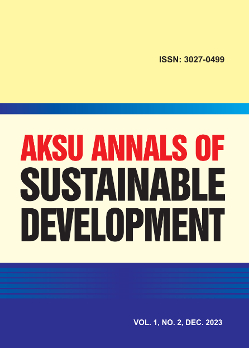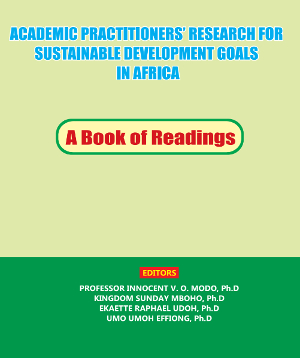WOMEN POLITICAL PARTICIPATION AND DEMOCRATIC DEVELOPMENT IN NIGERIA (1999 – 2023)
DOI:
https://doi.org/10.60787/AASD-v2i1-27Keywords:
Politics, political participation, democracy, marginalisation, governanceAbstract
Women make up over fifty percent of the population of Nigeria with huge socio-economic contributions, yet politically the women are largely marginalised as they are visibly seen occupying less important political positions. The paper interrogated the participation of women in the political landscape of Nigeria within the democratic dispensation of the Fourth Republic. A qualitative research, it employed the historical descriptive method of data collection and analysis, leaning on the feminist theory as the basis of analysis of the interplay between the struggle for power and the implication on the female folk in the country. Among others, the research found out that women are critical stakeholders in the Nigerian State yet several factors such as economics, the nature of politics, cultural practices and other socio-political factors shut the women out of political prominence. This results in women occupying very few positions, and is not able to clinch some exalted offices in the land. It recommended that the Nigerian government should implement the 30 and 35 per cent international affirmative action and the national gender policy on women; there is a need for the institutionalisation of a functional endowment fund to help the women bankroll the expensive nature of the political processes in Nigeria.
Downloads
References
Agara, T. (2024). Electoral integrity, democracy and national security: Nigeria’s Case in Perspective, Keynote address at the 5th Annual Conference of NPSA South- South Zone 10 – 13 March.
Ake, C. (1985). The future of state in Africa. International Political Science Review, 6(1), 105-114.
Akinyode – Afolabi, A. and Arogundade, L. (2003). Gender audit – 2003 election and issues in women’s political participation in Nigeria. Women Advocates Research and
Documentation Centre.
Alapiki, H. (2010). Politics and governance in Nigeria. Sharpee publishers.
Atakpa, O. E. and Udoms, B. E. (2015). Revolution against bad governance: Lessons of Arab Spring for Nigeria and
West African Countries. In Eminue, O. and M. Dickson (eds): Key issues in International Relations. University of
Nigeria Press, Pp.219-226.
Awofeso, O & Odeyemi, T.I. (2014). Gender and political participation in Nigeria: A cultural perspective. Journal of
Research in Peace and Development.4(6),104-110.
Bryson, V. (2003). Feminist political theory.: An introduction. Palgrave Macmillan.
Burchill, et al. (1995). Theories of international relations. Palgrave Macmillan.
Edidem, I. B. (2019). Women participation in politics, and the development of Nigerian democratic process 2003-2015. B.Sc.Project Submitted to National Open University of Nigeria.
Eke, O. (2022). Women’s representation in Nigeria’s national assembly: An assessment of their contributions to legislative activities of the 8th and 9th assemblies. A Master Degree
Dissertation Submitted to National Institute for Legislative and Democratic Studies University of Benin.
Ekekwe, E. (1986). Class and State in Nigeria. Longman.
Eminue, O. (2005). Introduction to political Science. Cats Publishers.
Ewepu, G., (2021, April 16). Appointment of seven women as ministers is poor under Buhari-led administration. Vanguard Newspapers.
Fatile, O., Akhakpe, L., Igbokwe-Ibeto and Oteh, C.O. (2012). Feminism and political participation in Nigeria: An empirical analysis. International Journal of Asian Social Sciences, 2(7), 1077-1092.
Finer, S.E. (1975). The man on horse-back: The role of the military in politics. Penguin books.
Human Rights Watch (1999). The price of oil: Corporate responsibility and human right violation in Nigeria’s oil-producing communities. Human Rights Watch.
Inter-Parliamentary Union (IPU) (1997). Universal declaration on democracy. Accessed from
http://www.ipu.org/ourwork/strongparliaments/settingstandards/universal-declarationdemocracy on January 31, 2019.
Jacqua, T. (2001). Feminism. In: Burchill, S., A Linklater, R., Devetak, J. Donelly, M. Paterson, C. Reus-Smit and J. True:
Theories of International Relations (3rd ed). Basingbroke: Palgrave Macmillan, pp. 213-234.
Lawson, C.C. & Wasburn, P. (1969), Power participation ideology. New York: Free press.
Nwabunkeonye, U. P. (2014). Challenges to women active participation in politics in Nigeria. Sociology and Anthropology2(7), 284-290.
Okoosi-Simbine, A. (2012). Gender politics and the 2011 elections. Journal of African Elections, 11(1), 74-99.
Olufemi, O. (2006). Democracy and Development. JojaEducational Research and Publishers Ltd.
Oluyeni, O. (n.d.) Monitoring participation of women in politics in Nigeria. A Paper Presented at the Forum for Millennium Development Goals Organised by United Nations bureau of statistics, Abuja, Nigeria. https://mdgs.un.org.gender.
Omotola, S. J. (2007). What is the gender talk all about after all? Gender power and social change in Nigeria African Study
Monographs, 28(1), 16-27.
PLAC (2018). Women’s political representation in Nigeria: Why progress is slow, what can be done to fast track it. http://www.plalng.orf.
Pabon, G., Udoms, B.E. &Atakpa, O. (2024). Post COVID 19 Nigeria and the 2023general elections. AKSU Journal of Administration and Corporate Governance (AKSUJACOG) 4(1), 161-175.
Pogoson, A. I. (2014). Women, political parties and exclusion in Nigeria, 1999-2012. In Obafemi, O. S., Egwu, O, Ibeanu& J. Ibrahim (eds). Political parties and democracies in Nigeria.
Kuru: National Institute of Policy and Strategic Studies (NIPSS).pp. 237-264.
Shively, W. P. (19970. Power and choice. An introduction to political science.McGraw Hill.
Tickner, J.A. (2020). Gender in international relations: Feminist perspectives on achieving global security. Columbia
University Press.
Udoms, B. E. & Atakpa, O. E. (2021). Governance deficit, Nigeria’s national security and national development: The
ENDSARS Perspective. AKSU Journal of Administration and Corporate Governance 1(1), 1-29.
Udoms, B. E. &Ibiamu, G. P. (2012). Globalisation, the economy and the social conditions of Nigerians. Nnamdi
Azikiwe Journal of Political Science, 3(2), 290-299.
Udoms, B. E., Atakpa, O. E. & Ekanem, P. (2017). Democracy, good governance and economic development of Nigeria:
Challenges and Prospects. Uyo Journal of Sustainable Development. 2(1), 35-51.
Udoms, B. E., Atakpa, O. E. & Ekanem, P. (2020). Election and Nigeria’s national security lessons from 2019 general
elections: UNIUYO Journal of Public Governance and Administration 2(1), 97-116.
Udoms, B. E., Atakpa, O. E. & Wilson, N. (2015). Human security as a strategy for achieving national security and
sustainable development in Nigeria. In Ukonmi A. S., D. E. Okon and L. Udensi (eds). Sustainable development in
Nigeria strategy and innovative options. Lap Lambert Academic Publishing Ltd. 89-106.
Zalewski, M. (2000). Feminism after post modernism. Routledge.
Downloads
Published
Issue
Section
License
Copyright (c) 2024 AKSU Annals of Sustainable Development

This work is licensed under a Creative Commons Attribution-NonCommercial-NoDerivatives 4.0 International License.
Manuscript content on this site is licensed under Creative Commons Licenses. Authors wishing to include figures, tables, or text passages that have already been published elsewhere are required to obtain permission from the copyright owner(s) for both the print and online format and to include evidence that such permission has been granted when submitting their papers. Any material received without such evidence will be assumed to originate from the authors.





 ICIDR Publishing House
ICIDR Publishing House